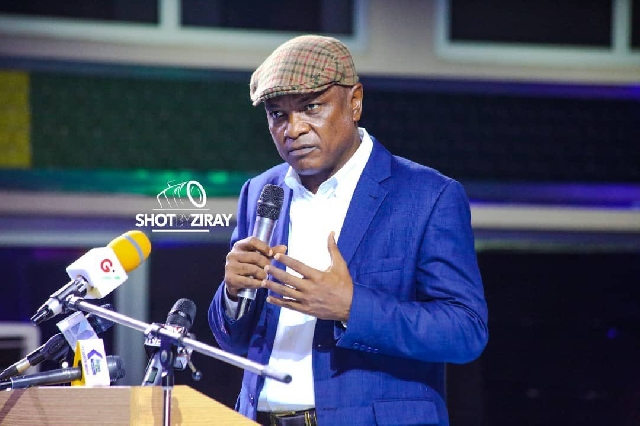'Big joke!' – Togbe Afede ridicules BoG's 1% policy rate cut, says 'more worrying is the possibility that they don't believe in their own numbers'
 Togbe Afede XIV, the Agbogbomefia of the Asogli State
Togbe Afede XIV, the Agbogbomefia of the Asogli State
The Bank of Ghana Monetary Policy Committee's one per cent cut in policy rate on Monday, January 29, 2024, from 30 per cent to 29 per cent 'sounds like a big joke", Togbe Afede XIV, the Agbogbomefia of the Asogli State, has said.
in a lon article, the traditional leader said "It is hard to imagine what impact our BoG officials expect a 1% reduction from 30% to make on lending rates, inflation rate, exchange rate or economic growth, let alone what they expect to learn or observe from it". "I wonder whether they have determined the correlation between interest rates, inflation and exchange rates in our country", Togbe Afede noted.
In his view, the "hesitant 1% rate cut to 29% is particularly surprising given their expectation that headline inflation would 'ease to 15%±2% by the end of 2024 and gradually trend back to within the medium-term target range of 8%±2% by 2025'".
"I do not see a relationship between the expected or target 15%±2% inflation and the high 29% monetary policy rate. It gives the impression that our top economists do not believe in themselves or their own forecasts", he interpreted.
He said "more worrying is the possibility that they do not believe in their own numbers, given their new claim of signs of 'emerging recovery', having previously told us that the economy had 'turned the corner'".
Read portions of Togbe Afede's article below:
Policy rate and open market operations
A central bank’s policy rate and open market operations are supposed to influence the rate of inflation. But BOG officials still have a fixation on headline or year-on-year inflation, and so cannot depart from their reactionary monetary policy approach, which responds to what had transpired, that is, past one-year price changes, instead of their expectation of inflation (15%±2% this year). So, the 1% reduction in the policy rate appears to be a reaction to the 3.2% fall in headline inflation in December to 23.2%%, from 26.4% % in November.
Thus, the key rate that commercial banks use as a reference for lending has been reduced to 29% after being pegged at 30% for six months. It is also invariably the reference rate for the Government’s domestic borrowing, setting a limit to the Government’s ability to exploit its power as the largest borrower. BOG often talked about “mopping up excess liquidity” without defining what was optimal. But an interest rate policy that results in 30% plus return to money market investors is itself responsible for the delivery of “excess liquidity”.
Victims of a myopic approach
I acknowledge the complexity of the interplay of the various macroeconomic variables.
But as I wrote in my previous article, “BOG has failed us”, our ridiculously high interest rates have been partly responsible for our high inflation rates, constantly weakening cedi, business failures, joblessness, and worsening poverty levels, pushing many of our younger compatriots into a desperate search for greener pastures abroad. I am surprised that the IMF not only backed but has insisted on this approach over the years.
It is the reason why businesses have to borrow at 36%, at which rate the amount of indebtedness almost doubles every two years (The Rule of 72). It has made it impossible to achieve the much-needed diversification and restructuring of our economy. So our foreign-dominated economy has remained dependent on the export of raw materials and the importation of finished products.
We have been victims of this myopic approach to monetary policy, that has imposed structural bottlenecks on our economy, for over 20 years. This has made it impossible for Ghana to meet the convergence criteria for the Ecowas single currency, the Eco. Our economy needs urgent stimulation, and a timid 1% rate cut from 30% to 29% will not help.
The cedi has suffered over the years, the dollar having been on the loose, gaining almost 200% over the cedi since 2017. But for the currency redenomination of 2007, US$1 would have been selling at a bagful of cedis, GH₵120,000, today. We cannot stabilise the exchange markets while treasury bill investors are making 30% nominal return on their cedis. Parity laws tell us that will not happen.
Global shocks or self-inflicted tragedy?
BOG will blame global shocks for our woes. But as I pointed out previously, Zambia and Kenya, for example, exposed to the same global shocks, have done remarkably better. Zambia recorded 12.9% and 13.1 inflation rates in November 2023 and December 2023, respectively. Kenya recorded 6.8% and 6.6%, respectively. Today, the Bank of Zambia’s prime rate is 11% and that of the Central Bank of Kenya 13%.
Reckless borrowing and corruption have combined with high cost of borrowing to make Ghana Africa’s most indebted country. Sadly, after taking the difficult step to reduce domestic debt through the draconian DDEP, we are still piling up short term debt – 91 Day Bill at 29.35%, 182 Day Bill at 31.95% and 364 at 32.49% – even when demand is very high.
High interest rates evidence instability. Thus, the unnecessarily high domestic interest rates have fed into external market perception of our outlook, giving international capital market predators a field day. We cannot through our policy rate give an impression of high inflation or high credit risk outlook and expect the external financial markets to think differently. BOG’s approach has been costly for us in the international financial markets, where it has created an exaggerated risk perception, with adverse implications for our credit rating. COCOBOD is currently suffering the consequence, having to borrow at an unprecedented 8%.
Who is benefiting?
In the business sector, banking has been and will be the only beneficiaries, baring any future haircuts. And soon, we will be hearing the usual BOG’s self-serving statement that, “The banking industry’s performance has defied the general economic downturn with strong growth across key metrics including total assets and deposits, as well as sustained improvement in profitability…”. But it does not require any banking ingenuity to make money in a 30% plus interest rate environment, even after providing for high levels of non-performing loans.
British financial economist and lecturer at Aston University in Birmingham, Dr. Sajid Mukhtar Chaudhry, was right when he said that banks in Ghana are too profitable. He suggested the imposition of a ‘Bank Tax’, as done by the likes of Australia, to generate more revenue for the Government. He thinks “it is not normal for banks to be that profitable”, and he expressed surprise that banks “earn much more than other industries” in Ghana.
Ultimately though, BOG were themselves victims of their bad monetary policy, announcing massive losses in 2022, totaling GH₵60 billion, and year-end negative net worth of GH₵55 billion, making it technically bankrupt. This is unprecedented in our history. The loss, equal to about 10% of our 2022 GDP, is one of the largest one-year losses ever recorded by a central bank.
Why the reluctance to cut rates?
But why is BOG clinging to a policy and an approach that has not only failed to keep inflation in check, but also made it difficult to effect the needed structural changes in the economy? The Bank’s virtual monopoly over government business and their ability to print money, no doubt, makes it a survivor.
One thing is clear however: BOG, given its extravagant spending, cannot hold its own in a low interest rate environment. This probably explains the need for the Bank to keep its policy rate high to protect its main revenue source – interest income. Its
“interest and similar income” amounted to GH₵5.09 billion in the difficult post-COVID 2022, up 47% from GH₵3,46 billion in 2021, and represents 92.7% of its total operating income of GH₵5.49 billion.
It may also be the case that BOG is reluctant to see interest rates fall quickly at this critical time when it needs to make more money to survive bankruptcy. A GH₵55 billion negative net worth is a huge burden.
Living in a different world
Details of BOG’s 2022 annual report says a lot. As I pointed out previously, budgeted and actual expenditures do not look like those of a struggling country’s central bank: US$ 250 million for a new head office, equivalent to 0.35% of our GDP; GH₵97.4 million for travel; GH₵131 million for motor vehicle maintenance/running; GH₵32 million for communication; GH₵67 million for computers; GH₵207,7 million for premises and equipment; GH₵336.9 million for currency issue (currency in circulation amounted to GH₵40.73 billion); GH₵287.83 million for other administrative expenses, etc.
Personnel costs amounted to GH₵1.62 billion. With a total of 2,203 employees, this meant an average remuneration of a colossal GH₵735,361 per employee in 2022 or GH₵61,280 monthly per employee, including several allowances. These employees also had staff loans amounting to GH₵1.247 billion, an average of GH₵566,046 per head.
BOG is also reported to be remodeling its regional offices, while investing GH₵142 million in a 50-bed guest house in Tamale.
I still cannot believe BOG and its staff are living in a completely different reality. Apart from its excessive operating expenses, proper cost-benefit analysis would not justify its investment in a new head office building and non-core activities like a hospital and guest houses.
BOG vs Bank of England (BOE)
It is hard to believe how some BOG’s operating income and expenses compare with those of Bank of England (BOE). For example, BOG spent GH₵1.62 billion (£147.27 million at 2022 average cedi-pound exchange rate) on its 2,203 employees, translating to £66,851 per staff. BOE on the other hand, with an average labour force of 4,675 per their 2021-22 financial report, spent £448 million, an average of £95,829 per staff.
Unlike BOE staff, BOG staff also enjoyed staff loans, with an average of GH₵566,046 (£51,459) outstanding per employee.
Source: classfmonline.com
Trending News

Central Regional NDC secretary caught revealing 'top' party secret
09:53
DOII Desmond Ackah is unfit to be PRO of GNFS-Lawyer
13:28
Bawa Rock only successful applicant among 31 aggregator bid-Sammy Gyamfi reveals
00:58
Ebo Noah remanded, ordered to undergo psychiatric assessment over doomsday flood prophecy
14:40
Seidu Agongo pledges full medical support for assaulted CMG journalist
09:27
Journalist assault: Officers found guilty risk dismissal – GNFS
08:41
GJA prez gives New Year package to over 2,000 households in the Greater Accra Region
00:48
Authentic Christian faith key to nation-building – Rev. Stephen Wengam
13:32
Transport fares can be reduced without risk – COPEC
08:25
“We do not agree with the 25% fee increment, whether by the SRC or GRASAG”- Dr. Apaak
07:14




